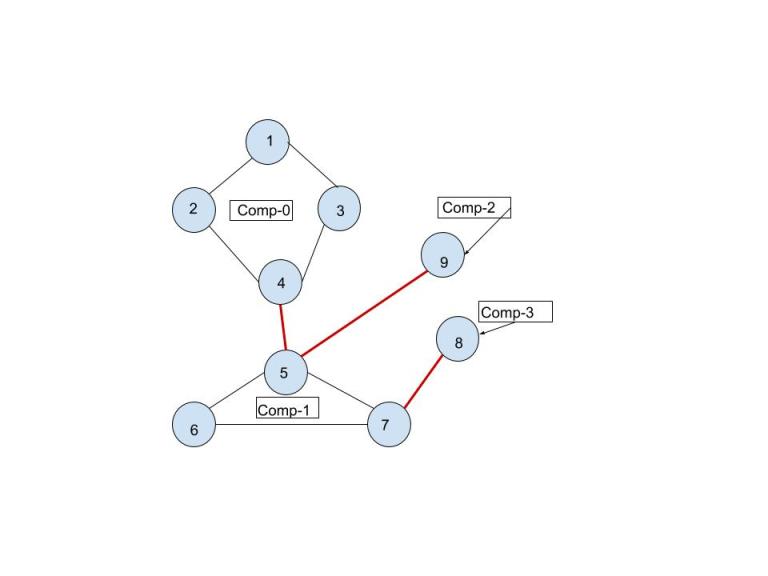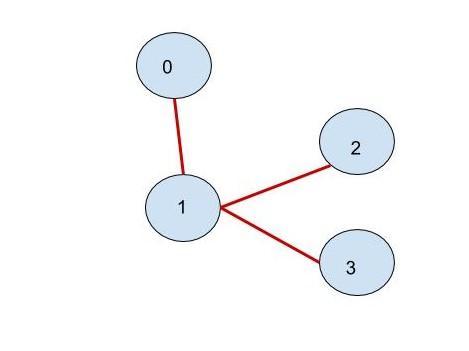After constructing bridge tree, we have bi-connected components as nodes and bridges as edges. Is there any possible way to print every bicomponent which is a node in bridge tree.
eg:
Its bridge tree is
Can we print all biconnected components from bridge tree itself?
Here in the above graph : Comp1 -> (1-2-3-4) Comp2--> (5-6-7) Comp3-->(5-9) Comp4---> (7-8)












Auto comment: topic has been updated by humblefOOOol (previous revision, new revision, compare).
Can any one help in this problem. Its from cf blog https://codeforces.net/blog/entry/83980#:~:text=2%2Dedge%20connected%20component%20in,have%20any%20bridges%20in%20it.
Not exactly sure what your question is, do you mean recover
from just looking at the graph? The IDs 1, 2, 3, 4 are just arbitrary numbers representing the components, there's no special connection between the number 1 and the set [1, 2, 3, 4]. If you mean recovering the original nodes after building the bridge tree, you could just store them in a 2D vector when building.
Yes I am maintaining a 2 -d vector but in this example I am not able to retrieve all components
My sample code
const int MAXN = 1e5 + 5; const int MAXM = 1e5 + 5;
int N, M, timer, compid;
vector<pair<int, int>> g[MAXN]; bool used[MAXN], isBridge[MAXM]; int comp[MAXN], tin[MAXN], minAncestor[MAXN];
vector tree[MAXN]; // Store 2-edge-connected component tree.(Bridge tree).
void dfs(int v, int p) { tin[v] = minAncestor[v] = ++timer; used[v] = 1; for(auto &e: g[v]) { int to, id; tie(to, id) = e; if(to == p) continue; if(used[to]) { minAncestor[v] = min(minAncestor[v], tin[to]); } else { dfs(to, v); minAncestor[v] = min(minAncestor[v], minAncestor[to]); if(minAncestor[to] > tin[v]) { isBridge[id] = true; } } } }
void dfs1(int v, int p) { used[v] = 1; comp[v] = compid; for(auto &e: g[v]) { int to, id; tie(to, id) = e;
if(isBridge[id]) { // avoid traversing from this edge. so we get full component. continue; } if(used[to]) { continue; } dfs1(to, v); }}
vector<pair<int, int>> edges;
void addEdge(int from, int to, int id) { g[from].push_back({to, id}); g[to].push_back({from, id}); edges[id] = {from, to}; }
void initB() {
for(int i = 0; i <= compid; ++i) tree[i].clear(); for(int i = 1; i <= N; ++i) used[i] = false; for(int i = 1; i <= M; ++i) isBridge[i] = false; timer = 0; compid = 0;}
void bridge_tree() {
initB(); dfs(1, -1); //Assuming graph is connected. for(int i = 1; i <= N; ++i) used[i] = 0; for(int i = 1; i <= N; ++i) { if(!used[i]) { dfs1(i, -1); ++compid; } } for(int i = 1; i <= M; ++i) { if(isBridge[i]) { int u, v; tie(u, v) = edges[i]; // connect two componets using edge. tree[comp[u]].push_back(comp[v]); tree[comp[v]].push_back(comp[u]); } }}
void init() { edges.clear(); edges.resize(M + 1); for(int i = 1; i <= N; ++i) g[i].clear(); }
void solve() { cin >> N >> M;
init(); for(int i = 1; i <= M; ++i) { int u, v; cin >> u >> v; addEdge(u, v, i); } bridge_tree();}
Here when i am creating a tree when i am trying to retrieve those components its not working
In your DFS method, you can maintain a stack holding all the nodes you visit, then whenever you encounter a bridge, continuously pop nodes off the stack until you pop off an endpoint of the bridge, and all nodes you just popped off will form a component in the bridge tree. It's easier to just show code:
If at the end of the DFS your stack isn't empty, then all remaining nodes in the stack form the last component.
Thank you so much. It absolutely worked. What if we create a block-cut tree. is it the same to retrieve the bcc from there too?
Yea, just pop from the stack at each articulation point instead of bridge.